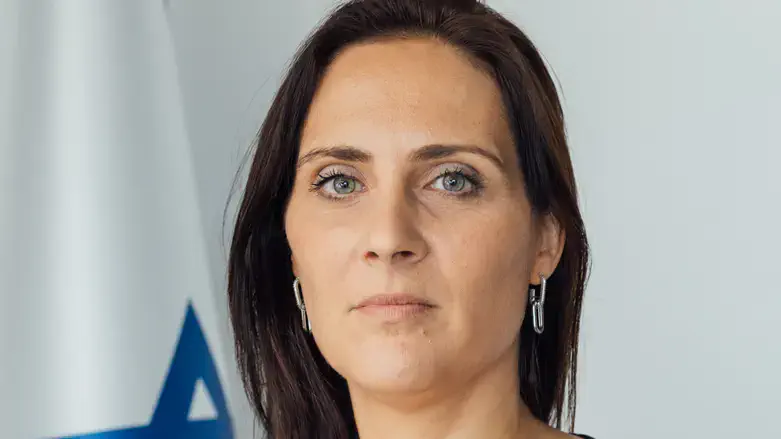
Oshy Ellman is an Israeli-born Olah from the United Kingdom and is a Ra’anana resident. She has two decades of experience in international relations and communications and is an active participant in the Olim community.
A controversial screening at a Reform temple in Ra’anana on Yom HaZikaron, Israel’s Memorial Day for Fallen Soldiers, sparked protests from local demonstrators. They were swiftly labeled a “right wing mob” and “rioters” in media coverage. The media narrative was echoed by the UK Board of Deputies, and Israel’s President added fuel to the fire, publicly condemning the demonstrators as “right-wing” and urging the police to spare no means in their investigations. Not one outlet or statement addressed the broader context or concerns raised by so many in the local community.
What they all overlooked were firsthand accounts from residents who were actually present, many of whom described the protests as relatively peaceful and disputed the claims of violence. Allegations of aggression, including reports of broken windows, have not been substantiated, and some eyewitnesses suggest that the narrative of “violence” was purposefully exaggerated, if not entirely fabricated. Yet rather than investigate or present a fuller picture, outlets repeated the same one-sided account, offering no balance, verification, or context.
The screening itself was no ordinary memorial, it was the first time that the fringe “Israeli-Palestinian Memorial Day” ceremony had been hosted in Ra’anana. This event, which equates terrorists with their victims, was deeply painful for many in the city, especially bereaved families who learned it honored the very individuals responsible for murdering their loved ones. Among those remembered were terrorists like the Abu-Shahab brothers, directly tied to attacks on Israeli civilians.
No one condones violence or incitement if it indeed happened, but what’s been missing in the rush to condemn demonstrators is any reflection on how offensive and provocative the event was to begin with. The ceremony, held in a city-funded place of worship on one of Israel’s most sacred days, was a political act cloaked in the language of peace. That it proceeded despite pleas from residents, and in a year of ongoing war and mourning, made it even more unbearable.
The failure here lies not with the protesters, but with Ra’anana’s municipal leadership. At a time when unity, empathy, and sensitivity are more critical than ever, when soldiers are still falling in battle, the Mayor and his team enabled an event that undermined the day’s sanctity and poured salt on the wounds of grieving families.
Cities across Israel canceled similar events this year out of respect. Ra’anana did not. Its silence was not neutrality; it was complicity.
What’s worse, labeling this as “right-wing extremism” dismisses the very real pain and legitimate concerns of Ra’anana’s residents. These are not radicals, they are citizens who felt betrayed by city leaders who gave a platform to those who honor terrorists while their own children are fighting and dying in uniform to protect their country.
Even more troubling was the hypocrisy that followed. Just days later, demonstrators - many of them brought in from outside Ra’anana - took to the streets in protest, supporting a narrative of “violence” at the Reform temple that eyewitnesses say never occurred. They went so far as to label the Yom HaZikaron protest a “pogrom”, a deeply offensive and grotesque weaponization of language against grieving families who dared express outrage.
Ironically, among these so-called “anti-violence” demonstrators were adults who were the most violent of all. They physically assaulted local teenagers attempting to engage in dialogue in unprovoked attacks. Shockingly, some of the leading figures organizing these demonstrations are Ra’anana’s current leaders. And yet, for this violent protest caught on camera, no condemnation from the Mayor, the City Council, or the President. No media scrutiny. No accountability.
This was followed by another unlawful and equally aggressive demonstration, where protesters lit fires, blocked roads, and even obstructed local fire brigades from extinguishing the flames. Once again, there was complete silence. No condemnation.
This glaring double standard, swift condemnation of the "right," or religious, and total silence when the aggression comes from the "secular left", needs to be called out because it is dangerous and divisive. No one is defending hatred or aggression, if and when it occurs, but condemnation cannot be selective or politically convenient. Just as importantly, we must not ignore what brought us to this moment in the first place - a city’s leadership that abandoned its people in favor of optics, that chose silence over solidarity, and that failed to show the basic compassion that its residents, especially the bereaved, so deeply needed.
Ra’anana, once a symbol of coexistence and compassion, is now a city led by political opportunists and fringe activists, where divisive slogans take precedence over the values of dignity, unity, and remembrance.
Ra’anana does not belong to extremists, on the right or the left. It belongs to its residents: secular and religious, traditional and progressive, grieving and proud. On Yom HaZikaron, it belongs especially to those who have lost the most. They deserve to be heard. They deserve to be respected. They deserve better.